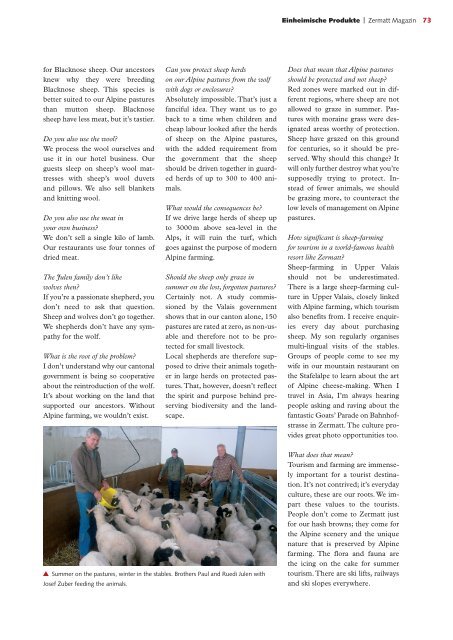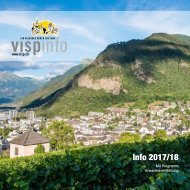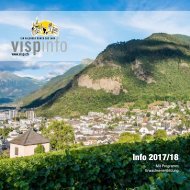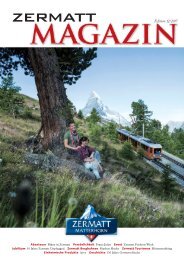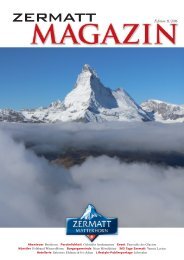Zermatt Magazin 2015
Zermatt Magazin 2015
Zermatt Magazin 2015
Sie wollen auch ein ePaper? Erhöhen Sie die Reichweite Ihrer Titel.
YUMPU macht aus Druck-PDFs automatisch weboptimierte ePaper, die Google liebt.
Einheimische Produkte | <strong>Zermatt</strong> <strong>Magazin</strong> 73<br />
for Blacknose sheep. Our ancestors<br />
knew why they were breeding<br />
Black nose sheep. This species is<br />
better suited to our Alpine pastures<br />
than mutton sheep. Blacknose<br />
sheep have less meat, but it’s tastier.<br />
Do you also use the wool?<br />
We process the wool ourselves and<br />
use it in our hotel business. Our<br />
guests sleep on sheep’s wool mattresses<br />
with sheep’s wool duvets<br />
and pillows. We also sell blankets<br />
and knitting wool.<br />
Do you also use the meat in<br />
your own business?<br />
We don’t sell a single kilo of lamb.<br />
Our restaurants use four tonnes of<br />
dried meat.<br />
The Julen family don’t like<br />
wolves then?<br />
If you’re a passionate shepherd, you<br />
don’t need to ask that question.<br />
Sheep and wolves don’t go together.<br />
We shepherds don’t have any sympathy<br />
for the wolf.<br />
What is the root of the problem?<br />
I don’t understand why our cantonal<br />
government is being so cooperative<br />
about the reintroduction of the wolf.<br />
It’s about working on the land that<br />
supported our ancestors. Without<br />
Alpine farming, we wouldn’t exist.<br />
Can you protect sheep herds<br />
on our Alpine pastures from the wolf<br />
with dogs or enclosures?<br />
Absolutely impossible. That’s just a<br />
fanciful idea. They want us to go<br />
back to a time when children and<br />
cheap labour looked after the herds<br />
of sheep on the Alpine pastures,<br />
with the added requirement from<br />
the government that the sheep<br />
should be driven together in guarded<br />
herds of up to 300 to 400 animals.<br />
What would the consequences be?<br />
If we drive large herds of sheep up<br />
to 3000 m above sea-level in the<br />
Alps, it will ruin the turf, which<br />
goes against the purpose of modern<br />
Alpine farming.<br />
Should the sheep only graze in<br />
summer on the lost, forgotten pastures?<br />
Certainly not. A study commissioned<br />
by the Valais government<br />
shows that in our canton alone, 150<br />
pastures are rated at zero, as non-usable<br />
and therefore not to be protected<br />
for small livestock.<br />
Local shepherds are therefore supposed<br />
to drive their animals together<br />
in large herds on protected pastures.<br />
That, however, doesn’t reflect<br />
the spirit and purpose behind preserving<br />
biodiversity and the landscape.<br />
Does that mean that Alpine pastures<br />
should be protected and not sheep?<br />
Red zones were marked out in different<br />
regions, where sheep are not<br />
allowed to graze in summer. Pastures<br />
with moraine grass were designated<br />
areas worthy of protection.<br />
Sheep have grazed on this ground<br />
for centuries, so it should be preserved.<br />
Why should this change? It<br />
will only further destroy what you’re<br />
supposedly trying to protect. Instead<br />
of fewer animals, we should<br />
be grazing more, to counteract the<br />
low levels of management on Alpine<br />
pastures.<br />
How significant is sheep-farming<br />
for tourism in a world-famous health<br />
resort like <strong>Zermatt</strong>?<br />
Sheep-farming in Upper Valais<br />
should not be underestimated.<br />
There is a large sheep-farming culture<br />
in Upper Valais, closely linked<br />
with Alpine farming, which tourism<br />
also benefits from. I receive enquiries<br />
every day about purchasing<br />
sheep. My son regularly organises<br />
multi-lingual visits of the stables.<br />
Groups of people come to see my<br />
wife in our mountain restaurant on<br />
the Stafelalpe to learn about the art<br />
of Alpine cheese-making. When I<br />
travel in Asia, I’m always hearing<br />
people asking and raving about the<br />
fantastic Goats’ Parade on Bahnhofstrasse<br />
in <strong>Zermatt</strong>. The culture provides<br />
great photo opportunities too.<br />
Summer on the pastures, winter in the stables. Brothers Paul and Ruedi Julen with<br />
Josef Zuber feeding the animals.<br />
What does that mean?<br />
Tourism and farming are immensely<br />
important for a tourist destination.<br />
It’s not contrived; it’s everyday<br />
culture, these are our roots. We impart<br />
these values to the tourists.<br />
People don’t come to <strong>Zermatt</strong> just<br />
for our hash browns; they come for<br />
the Alpine scenery and the unique<br />
nature that is preserved by Alpine<br />
farming. The flora and fauna are<br />
the icing on the cake for summer<br />
tourism. There are ski lifts, railways<br />
and ski slopes everywhere.


